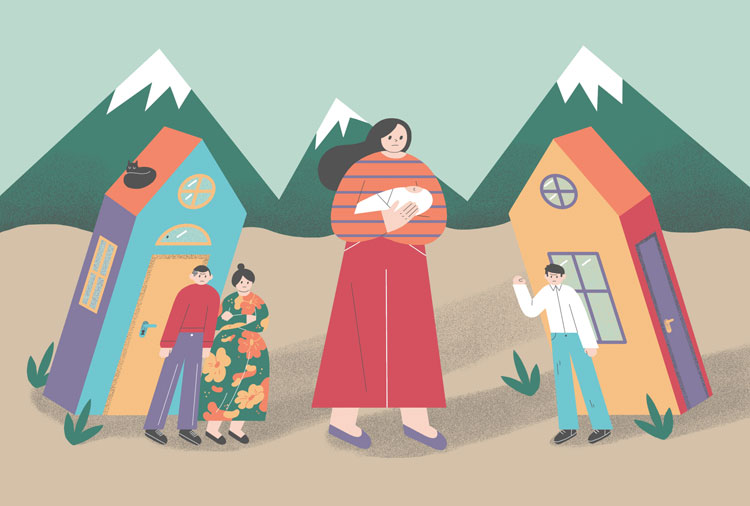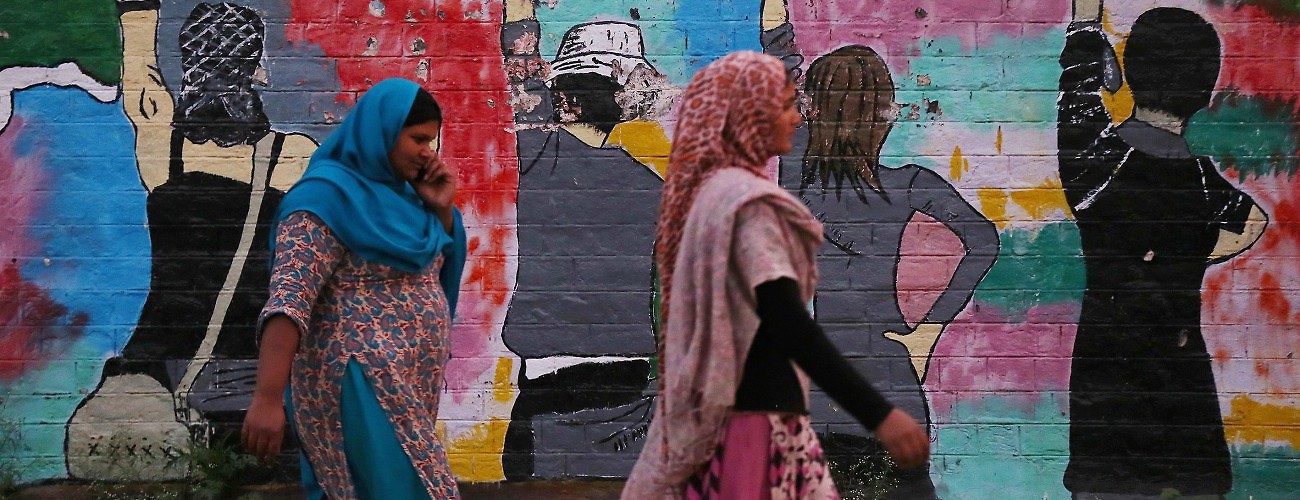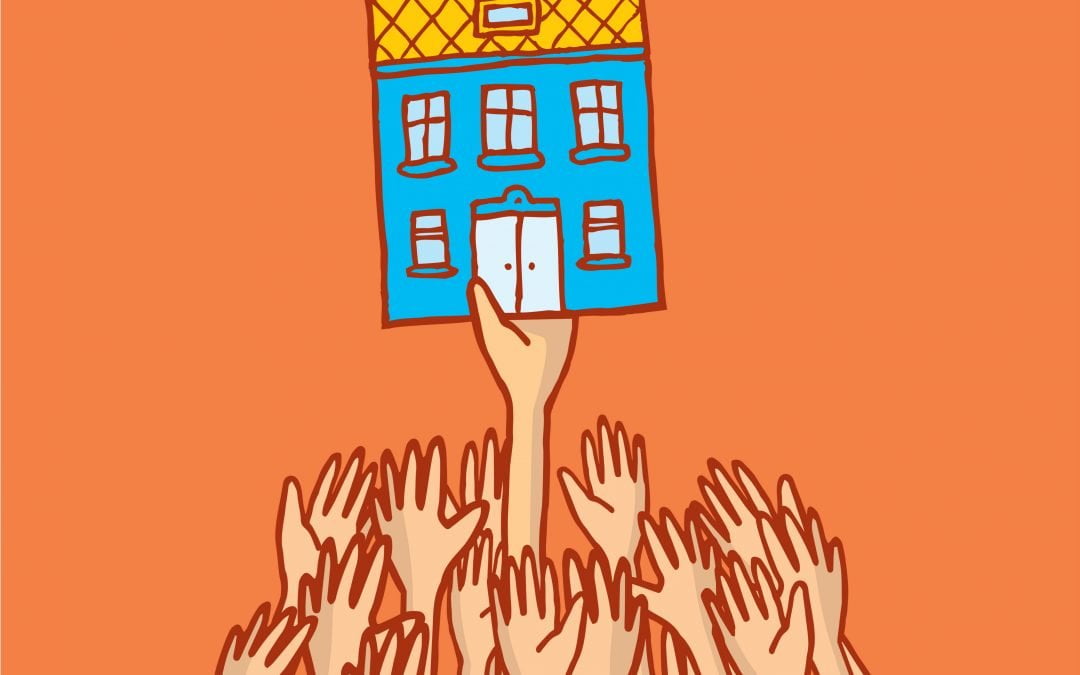For ages, women have been bearing the brunt of being considered a ‘weaker section‘ in the society. With gender disparity, rising gender injustice and gender based discrimination, women are further coerced into surrendering their rights. In several Indian societies like Kashmir, women have been deprived of their property rights, leaving them more or less dependent on the support of male members.
As a social norm in a patriarchal society, women are pressurised to surrender their property share to their male siblings. Those who dare to fight back and stand for their rights end up being silenced in our conservative social setup, where women after marriage don’t have the moral right to intervene in matters related to their parental family homes. The consequences of this norm has affected divorced women who are rendered vulnerable in such situations.
In June 2020, during the strict Covid lockdowns when homes were the safest places for people, Ruqaiyah , a 30 year old woman was looking for one. Holding her five year old daughter Hayam in one hand and some necessary belongings in the other, she moved to a rented accommodation in the town. Born at Iqbalabad Anantnag, Rukaiyah was married in a nearby village.
Back in 2018, after five years of marriage, Rukaiyah came to know about her husband’s extra-marital affair. After confirming the same with her husband, she left her in-laws in haste and rushed to her parental home, where her widowed mother lives with her only brother. Ruqaiyah was aware that her decision might increase the sufferings of her family, but she says she has suffered a lot in silence for years. “My decision jolted my mother. Nothing can be more tragic for a widowed mother than her daughter returning from her in-laws with a baby girl in her lap, but I had no other choice. Initially, I longed for my husband to come and convince me, but as time passed and nobody came, my hopes of reconciling broke down one after another“, she says.

With a baggage of pains, apprehensions and responsibilities, Ruqaiyah tried her best to hide her inner storm from her daughter Hayam. Things moved smoothly for Ruqaiyah until she lost her job as a private school teacher in August 2019, after the abrogation of Article 370.The school where she worked made some job cuts due to the situation prevailing back then. “Things changed drastically, my worries doubled. My only source of income was lost,” Ruqaiyah sighs.
As soon as Ruqaiyah broke the news of her job loss to her family, she sensed an insecurity in her brother. According to Ruqaiyah, her brother started blaming her for the failure of her marriage and pressurised her to go back to her in-laws. “He started treating me like a stranger and would look at me with disgust. My mother faced the wrath of his anger every day‘, she recalls.
After almost a year, Ruqaiyah legally approached her brother for the share in their ancestral property to secure her sustenance. “To my surprise, the very next day, he was a completely different person. Sibling love was replaced by hostility and anger, and ultimately, he threatened me to vacate his house“, says Ruqaiyah, as she brushes Hayam’s hair. “I don’t earn enough to keep on fighting in the court and pay the lawyers. When you have to choose between basic necessities for your kid and paying the lawyer, what would you opt for?” she asks.
Echoing these thoughts, Hafeeza Muzzafar, the ex-head of the Women’s Commission in Kashmir says, “Women in Kashmir are ignorant because of lack of awareness about their rights. Shariyah gives women the right to parental property but the patriarchal traditions where they are later jilted by their brothers prevents them from asking for their inheritance rights”
Both religion as well as the constitution recognise the property rights of women. According to Muslim law, in inheritance, the daughter’s share is equal to one half of the son’s. Daughters have rights of residence in the parent’s houses, as well as right to claim maintenance from their partner, after they are divorced.
However, men vociferously claim their right on their father’s property and wealth. Women exercising the same right are blamed for deviating from expected behaviour, causing social alienation. Thus, girls demanding their economic rights are pictured as going against societal traditions, often forcing them to not make any claim at all.

Echoing these thoughts, Hafeeza Muzzafar, the ex-head of the Women’s Commission in Kashmir says, “Women in Kashmir are ignorant because of lack of awareness about their rights. Shariyah gives women the right to parental property but the patriarchal traditions where they are later jilted by their brothers prevents them from asking for their inheritance rights.“
Bringing together her professional experiences, she further adds, “Usually, after the death of parents, brothers are least concerned about the survival of their sisters and hardly bother to visit them. Women should know that their share is their security, it is something which belongs to them only.”
Denial of alimony to some divorced women has made them the worst recipients of stigma and discrimination, forcing them to live a life of misery. Zareefa, a divorcee from South Kashmir lives separately in an old mud house which belongs to her brothers. Zareefa has neither got any alimony to raise her 8 year old son Asif, nor any property share from her in-laws. Back in 2013, when Zareefa was four months pregnant, she was diagnosed with a neurological disorder. Keeping her health condition in view, her in-laws sent her to her parental home.
Also read: What Is The Link Between Economic Policies And Women’s Rights?
Six months after her delivery when Zareefa was hoping to return, her husband broke the news of his second marriage. Since then, Zareefa has been living in her paternal home along with her son. Since Zareefa lost both her parents, she is living on the mercy of her two brothers. While narrating the tale of her agony, she says, “I had raised a claim to my in-laws for my son’s share in the property but in return, they asked for his custody. After my divorce, my son is my only hope in life. I cannot survive for a day without him, so I chose him over alimony,” says Zareefa.
Zareefa’s brothers too have not given her any share in their ancestral property, which she has not claimed either. She is desisting from claiming it out of the fear of antagonising her brothers. “I am grateful to my brothers for providing me shelter but I fear that my son might not get the same treatment if I die tomorrow because here, nothing belongs to him.”

Coeval to Ruqaiyah in age and suffering, Saima Akhtar has the same tale to tell. Saima has been fighting for her property share for three years. Back in 2012, when Saima, against the will of her brothers married Sabzar Ahmad, a tailor by profession, her brothers as well as the extended family abandoned her. “After my father left, my brothers were looking for a high profile match for me. But, when I married a tailor they felt embarrassed, because he didn’t match their standards,” she says.
After seven years, when Saima demanded her share in the property which she required to build a new house, her brothers denied her any share, citing the excuse that she had married against their will. When Saima approached the court, she was tagged ‘immodest‘ by the whole family. “My whole family stood against me, they called me shameless. Does claiming for your rights make one immodest? If so, what should we call the ones who deprive their sisters of their rights?” she asks. “I am not asking for charity, rather, it is my right which they will have to give. Maybe not now but I will get it“, she adds.
“After my husband died, none of my brothers visited me, neither have they provided me any financial assistance ever. I lost my father at a tender age. He had two apple orchards and some paddy land which was distributed among my two brothers while I and my sisters never claimed our share. Perhaps, it is because we have been made to believe that a daughter once married should neither claim nor intervene in matters at her parental home, or her brothers will consider her an enemy,” Shabnum adds
A professional social worker and a human rights activist from Kashmir, Essar Batool says, “There is a widespread denial of property rights when it comes to women’s inheritance claims. In many years of working with women, I have seen women being shamed for asking what is their right. This is hypocritical of a society that claims to adhere to Islamic values but denies women most of their rights. Patriarchal norms force a woman to be accommodating and sacrifice her rights, happiness and comfort for others. This reflects in all aspects of life in our society. Essentially, a woman who is vocal about her rights or demands them is labeled ‘shameless’. The association of shame with women has long been weaponised to force women into submission.”
Unlike Saima who dared to claim her rights, most women choose to remain silent and are hesitant to claim their rights. They believe that asking for a share in the ancestral property would impact their personal relationships.

Sometimes people justify it on the grounds that a daughter is paid dowry and finances are spent at her wedding, thus making the son the only heir of the property. Shabnum, a 38 year old from a remote village of Kulgam has two daughters who became her biggest responsibility, after her husband died of cardiac arrest.
Shabnum is financially helped by her neighbors and the Awqaf committee in the area. She lives in a one story mud house with her two daughters aged 8 and 6. “I don’t own any property except this house. I manage my expenses working as a sweeper in a private hospital where I get paid 2300 Rupees monthly. Moreover, the people in the vicinity also provide me financial help at times, considering my condition,” she says.
“After my husband died, none of my brothers visited me, neither have they provided me any financial assistance ever. I lost my father at a tender age. He had two apple orchards and some paddy land which was distributed among my two brothers while I and my sisters never claimed our share. Perhaps, it is because we have been made to believe that a daughter once married should neither claim nor intervene in matters at her parental home, or her brothers will consider her an enemy,” Shabnum adds.
Also read: We Cannot Talk About Economics Without Talking About Gender
Author’s Note: Some names in the story have been changed to maintain privacy of the sources
Featured Image: Systems Real Estate




